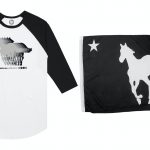The Dark Side of the White Pony: The Deftones
New Album Raises Them from the Underground
by Vanessa Lops
www.deftonesworld.com
————–
It’s 3 o’clock in the afternoon in Virginia and, as the phone is rings, I’m expecting a gruff
tour manager to answer it, screaming, “Whaddaya want??!!” Behind him, I’d like to imagine a
room full of deafeningly loud music and a bunch of drunken roadies, partying and acting the way
we all dream rock stars act at 3 o’clock in the afternoon. I am to be sorely disappointed.
Chino Moreno, diabolic soundpiece for the Deftones, greets me on the phone and politely explains,
“I’m at the mall trying to buy some shoes.” Buying shoes???
“Actually,’ says Moreno, ‘I get my shoes stolen almost every other day, so I’ve got a shoe fund
now.”
The Deftones — comprised of Stephan Carpenter on guitar, Frank Delgado on turntables, Chi
Cheng on bass, Abe Cunningham on drums, and Moreno on vocals/guitar — recently released White
Pony, their third album on Maverick Records.
“The name started out as the graphic itself, the picture of a pony,” Moreno explains.
“I thought we should use it as propaganda to represent our individuality, to say, ‘We are the
white pony amongst all these other bands,’ and we stuck with it.”
While White Pony suggests a tame, unassuming innocence, the Deftones’ new album is ripping
through the charts like the Black Stallion, shooting these guys straight into the record
industry’s Winner’s Circle. The first single, “Change,” is on dozens of radio playlists,
including San Diego’s Rock 105.3, and tickets to their shows are selling like marriage licenses
in Vegas. The album seems likely to flush these veterans from the underground and make the
Deftones a household name.
The usual rock-and-roll ‘Success Story’ is short-lived and tumultuous: Groups gain instant
success by xeroxing the latest rock trend, then their frail bubble bursts when the next trend
eclipses their temporary, borrowed star. But this is not the Deftones’ story.
Prior to White Pony, the band had already trotted a few warm-up furlongs through success. Their
two previous albums sold over 1.2 million copies combined, and established the Deftones not
only as trailblazers on the rap/metal front but also as a legitimate, reliable revenue stream
for Maverick. These numbers were reached without a hit single and without bribing MTV for
video-play. Instead, the band developed a very loyal, underground fan base. One would think
this would put them in a position to make a hit single, manipulate their marketing to appeal
to the masses, hire an image man and usurp the ephemeral King of Rock throne, right?
Wrong. What the Deftones chose not to do is as responsible for their success as what they chose
to do: They went about making aggressive music and refused to package it as some new toy for
testosterone-addled frat cats. By shunning proven rock paradigms and heeding their own
instincts, they proved their musical depth and passion, adding their own chapter to the book of
Modern Rock.
“I think it’s a natural evolution,” says Moreno. “We didn’t have a set mind going into this
record, we just wanted to do something a bit left-field of everything that was going on.”
The band demonstrated their commitment to this philosophy when Maverick requested the creation
of a more mainstream version of “Pink Maggot.” “I did a straight-up rap/rock version of it, so
I could show them that if I wanted to do this cheesy, rap/rock shit, I could,” explains Moreno.
“So I played it, they loved it, and I said, ‘Good — now it’s not going on the record.'”
While the Deftones wanted to steer against the grain, they were still concerned about fans’
reactions to the softer sonics on White Pony. “Honestly, I was a little worried when it first
came out. I wondered, ‘Man, what if people trip out? Did we completely alienate our fans?’
But we’ve always had these elements in our music and now the highs are higher and the lows are
lower.”
The album took a year to make, considerably longer than their previous two albums, with the
extra time spent on the songwriting. Traditionally, Moreno inks out the lyrics and the band
convenes later to write the music. On White Pony, he explains, the bandmembers wrote together
as well as separately and compared the results.
“That has a lot to do with why the record is so diverse,’ he says, ‘but it’s a good balance.
I think we all wanted to go the same place with the record, but had different ways of getting
there, so sometimes tension built up and we’d freak out. But it all worked out in the end.”
White Pony continues to champion the Deftones’ signature, abstract lyrics, including the song
“Feiticiera” (named after a Brazilian television show on which contestants compete for the
chance to drink from the hostess’ navel), a song in which the narrator is kidnapped.
While the captive is obviously being held against his will, the listener must decide whether or
not he is enjoying himself. “Digital Bath” describes someone electrocuting a girl in a bathtub
and wanting to experience that sensation — but despite its violence, it has a passionate,
beautiful landscape of sound, typical of the band’s sweet-yet-sinister side.
The album’s closing track, “Pink Maggot,” begins with just guitars and vocals, invoking
nakedness and inferiority; yet, by the time it hits the final, climactic chorus, it is about
taking control and feeling triumphant. “A lot of bands these days gear towards kids that get
picked on in school and say, ‘Its okay, I was picked on, too,'” Moreno says. “It’s not okay to
be picked on — it’s okay to be different, but when you start to think, ‘Oh, I’m different’ and
feel sorry for yourself, you’re not progressing in life. Confidence is one of the most important
things in life, and if you have it, you can basically do anything. ‘Pink Maggot’ is a confidence
builder, an end-of-the-record, epic kind of feeling.”
The CD is available in an enhanced version with features such as video footage of the band,
lyrics, and a “Pac-Man”-type video game that uses a white pony as the Pac-Man while the
bandmembers’ faces are trying to kill it. Much to his chagrin, Moreno’s face moves the slowest.
“I think Chi [Cheng] is the fastest,’ he laments. ‘That’s whack!”
The band also used some strategic marketing tools for this album, beginning with an
interactive, Internet “house party” projected live from a club on the Santa Monica Pier to fans
connected to the band’s Website. They also issued a limited-edition version of the CD, only
100,000 copies, which include an additional song, “The Boy’s Republic.”
Moreno and Abe Cunningham were junior-high classmates in Sacramento, way back in 1989.
Knowing that Cunningham was a drummer and neighbor Stephan Carpenter played guitar, Moreno
dragged Cunningham home on the bus after school one day and introduced them. They started
writing songs. A reluctant Moreno was asked to sing.
“Probably because I was the guy who hooked them up,” explains Moreno. “And I was like, ‘Nah,
I can’t sing,’ and they said, ‘Just do it,’ and so I tried. Then I just kept on doing it.”
Thus began the Deftones.
For the next year, they played out of a garage and finally booked their first show — at a
backyard barbecue. “We didn’t try to make it big and have a record deal or anything like that,
we were just kids having fun,” says Moreno.
Their first club show was in a 300-seater club, where the band bought a slew of tickets
themselves and gave them away at school. “We really rocked it, and the promoter gave us shows
with some bigger bands in the Bay Area at the time, like Fungo Mungo and Psychofunkapus and,
eventually, Primus.
“At that first show, I asked Stephan, ‘What’s the name of our band?’ and he said, ‘The Deftones.’
I said, ‘Alright.'”
In 1994, while playing a gig in Bakersfield, the Deftones ran into future Korn producer Ross
Robinson, who swapped a Korn demo with the band for one of their own. As a result, the bands
started hooking up shows together. They booked a show in Los Angeles at the Dragonfly, and
Moreno distinctly remembers his first live Korn experience. “I remember standing there going,
‘Damn, these motherfuckers rock!’ I couldn’t believe there was another band out there like us,
because at the time I didn’t hear much stuff like what we were doing.”
A few days later, the Deftones decided to play an impromptu set after the headliners and Korn
had finished. The club was virtually empty except for Korn and a few straggling fans. What the
band didn’t realize was that a rep from Maverick was lurking in the back. Soon after, Moreno
and Cheng received a phone call at Tower Records, where they worked pricing magazines.
Maverick wanted to fly them down to L.A. for an audition.
“We were like ‘What????’ So they flew us down and we played. The president of Maverick watched
and we [had] played three songs when he interrupted us and said, ‘I don’t need to hear anymore,
I’ll sign you on the spot.’ I was like, ‘Daaaamn!!'”
The Deftones signed with Maverick and began work on their first album, Adrenaline. After its
1995 release, they toured with Bad Brains, then continued touring the U.S. for over two years.
Exhausted, they withdrew to Seattle and recorded Around the Fur, which took only four months
to record.
“We went to Europe to build a following and then came back to the states. Around the Fur
debuted at twenty-something on Billboard — we freaked out!” They got back on the road for
another two years, and then it was time to record White Pony.
“We started on White Pony when we got home from the Black Sabbath/Pantera tour.
We wrote some songs, then did Ozzfest, then came home and wrote some more.” The band
split their time between recording spots in Sausalito and Los Angeles, where their planned
studio schedule included a mere two weeks on vocals and two weeks mixing the album.
As it turned out, the vocals alone took over two months.
“I took my time,” explains Moreno. “I just really wanted to make sure I was making something
good.”
While in L.A., the band rented a house in the Hollywood Hills, which was the same reportedly
haunted space Korn and Orgy had previously rented for recording.
“I saw a couple of creepy things going on, doors moving and weird stuff,” Moreno recalls of the
old haunt. “Then I ran into the guys from Orgy at a bar a few nights later and they were like,
‘Are you staying at the Doheny house? Man, that place is bugged out!’ So I started staying at
a hotel. It was too nuts.”
Along with their dedication to the Deftones, both Carpenter and Moreno have engaged in side
projects. Carpenter’s band is called Kush, with B-Real from Cypress Hill and members of Fear
Factory. “It’s straight-up, heavy-ass shit,” explains Moreno. “I have the wimpy side project,
called Team Sleep. We do really slow stuff, keyboards and DJ with really soft vocals and
guitars. It’s like the song ‘Teenager,’ from White Pony.”
Prior to White Pony’s release, the Deftones did a short European tour, returning to their
homeland for the first distribution. So far, the White Pony tour is a hands-down success.
“This one debuted at number three,” Moreno says with modest pride. “It’s almost a pattern,
but it gets better and better. Almost every show is sold out, people are going insane trying
to get in, and the energy level is really high.”
Opening for Deftones on this tour is Glassjaw, a hardcore but melodic band. Moreno describes
them as “something different from the typical, aggressive, frat-rock kind of stuff that’s out
now.”
This tour ends in mid-August, and will take the Deftones back to Europe for a few weeks, after
which they’ll take some much deserved down time. But not too much time — soon after, they’re
scheduled on a package tour here in the U.S.
“I can’t confirm who the other bands on the tour are,’ Moreno teases, ‘but you’ll find out
soon.’




[…] sua individualidade, longe do fluxo de nu metal, como Chino Moreno (cantor) explica na Slamm Magazine 2000. Por outro lado, vários significados estão associados ao nome, então White Pony também […]